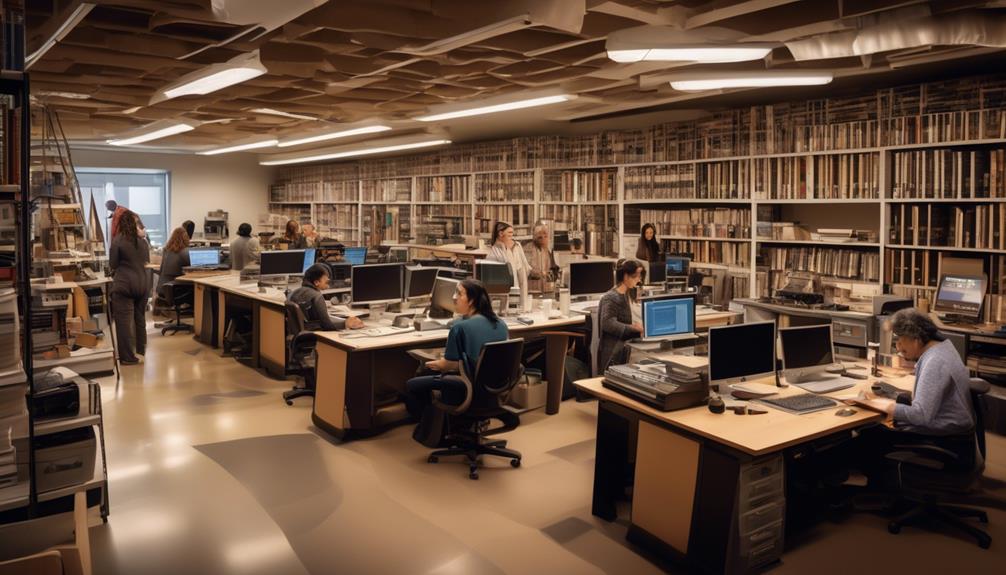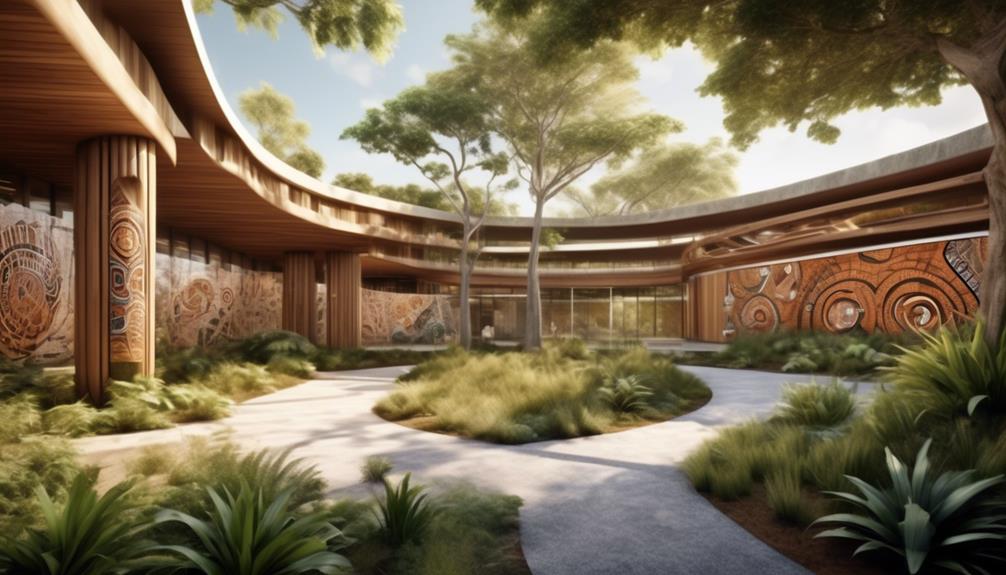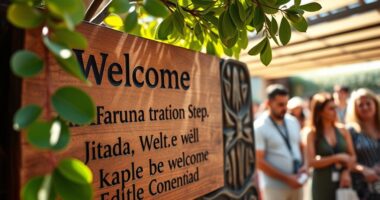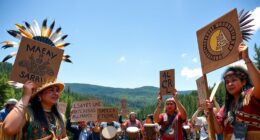Curious about how **Aboriginal languages** are preserved and revived? Explore the fascinating world of language revitalization and conservation. Discover the secrets behind keeping these ancient languages alive! Join us on this exciting journey to uncover the mysteries of linguistic heritage. Keep reading to unlock the hidden treasures of **Aboriginal languages** preservation.
The Aboriginal Languages Research and Resource Centre in New South Wales is at the forefront of these initiatives, providing essential support and resources for the revitalization of Aboriginal languages.
As we explore the center's establishment, mission, research initiatives, and collaborative community engagement, we will uncover the critical role it plays in preserving the cultural heritage and linguistic diversity of Aboriginal communities.
Key Takeaways
- The NSW Aboriginal Languages Research and Resource Centre was established to support the revival and preservation of Aboriginal languages in New South Wales.
- The Centre provides technical linguistic and teaching advice, research assistance, and support for recording language speakers.
- It offers tailored language revival training, mentorship programs, and administers grants for projects aimed at reviving NSW Aboriginal Languages.
- The Centre recognizes the role of communities in language preservation and revitalization, and collaborates with stakeholders to address unique preservation challenges and ensure Aboriginal voices and languages are heard and valued.
Establishment and Mission
Upon its establishment, the NSW Aboriginal Languages Research and Resource Centre embarked on a mission to provide crucial support for the revival and preservation of Aboriginal languages in New South Wales. Our aim is to ensure that the rich tapestry of Aboriginal languages thrives and remains an integral part of the cultural heritage of the region.
We're dedicated to offering technical linguistic and teaching advice, research assistance, and support to record language speakers. Additionally, we provide relevant language revival-related training tailored to community needs, as well as mentoring for networking and collaboration between various language initiatives across the State.
As advocates for the revival of Aboriginal languages, the NSW Aboriginal Languages Research and Resource Centre acts as a central point of contact for information about Aboriginal languages in New South Wales. We administer the DAAs Community Language Assistance Program and provide grants ranging from $5000 to $50,000 for projects aimed at reviving NSW Aboriginal Languages. Our efforts are further bolstered by our collaboration with the Geographical Names Board on naming geographical places in NSW, ensuring that the Aboriginal languages are embedded in the very fabric of the land.
Research Initiatives and Projects

We actively engage in various research initiatives and projects to contribute to the revival and preservation of Aboriginal languages in New South Wales. Our focus on Aboriginal Language Research and language revival is aimed at supporting Indigenous Languages and preserving the rich tapestry of language and culture within our communities.
The Languages Research and Resource Centre provides technical linguistic and teaching advice to aid language projects. We offer research assistance and resources for recording language speakers, aiding in documentation and preservation efforts.
Additionally, our tailored language revival training and mentorship programs are designed to support Aboriginal language initiatives across New South Wales, ensuring that the knowledge and wisdom of each language group are passed down to future generations.
As advocates for the revival of Aboriginal languages, we serve as a central point of contact for language-related information and administer grants for language revival projects. The establishment of the Aboriginal Languages Trust under the NSW Aboriginal Languages Act 2017 further underscores our commitment to nurturing the growth of Aboriginal languages in NSW.
Resource Offerings for Language Learners
Our commitment to the revival and preservation of Aboriginal languages in New South Wales extends to providing a range of resources catered specifically to language learners. At the NSW Aboriginal Languages Research and Resource Centre, we understand the importance of supporting language learners in their journey to revitalize community languages.
Here are the offerings we provide to assist language learners in their endeavors:
- Technical Linguistic and Teaching Advice: Our centre offers technical linguistic and teaching advice to support language learners in their language revival efforts.
- Research Assistance and Recording Support: We provide research assistance and help in recording language speakers to preserve and revive Aboriginal languages, ensuring that valuable linguistic knowledge isn't lost.
- Tailored Training and Mentoring: Tailored language revival related training and mentoring are available to meet the specific needs of Aboriginal communities, supporting the preservation of community languages.
- Grant Administration and Advocacy: The Centre advocates strongly for the revival of Aboriginal languages and administers grants to support language revival projects, fostering a supportive environment for language learners within the wider Aboriginal Affairs framework.
Through these offerings, we aim to empower language learners and contribute to the revitalization and preservation of Aboriginal culture and languages.
Collaborative Community Engagement

Engaging collaboratively with communities is essential for fostering inclusive and sustainable solutions to address language preservation and revival efforts. At the Aboriginal Languages Research and Resource Centre, we recognize the invaluable role of communities in the preservation and revitalization of Indigenous languages in NSW. By actively involving Aboriginal and Torres Strait Islander people and communities in our initiatives, we aim to create a supportive environment that values their linguistic heritage and empowers them to take the lead in language revitalization efforts.
Our approach to collaborative community engagement involves building partnerships and fostering relationships with various stakeholders, including indigenous communities, linguists, government agencies, and educational institutions. By promoting active participation and sharing of knowledge, resources, and expertise, we strive to address the unique language preservation challenges faced by different communities. Through this inclusive approach, we not only acknowledge the diverse perspectives and contributions of Aboriginal people, but also work towards sustainable solutions that reflect the needs and aspirations of the community.
Together, we're committed to ensuring that the voices and languages of Aboriginal and Torres Strait Islander people and communities are heard, valued, and preserved for generations to come.
Impact on Aboriginal Language Preservation
The preservation and revival of Aboriginal languages is of utmost importance for maintaining cultural traditions and identity within Indigenous communities. The impact on Aboriginal language preservation is profound and affects the well-being of Aboriginal and Torres Strait Islander communities in various ways:
- Cultural Identity: Aboriginal languages are often the first language spoken within families and communities. The loss of these languages can lead to a disconnect from cultural heritage and traditions.
- Community Well-being: Aboriginal languages are integral to the cultural, social, and emotional well-being of Indigenous communities. Their loss can have a detrimental impact on the overall health and vitality of these communities.
- Knowledge Preservation: Aboriginal languages hold significant cultural knowledge and connections to the land. The erosion of these languages diminishes the transmission of vital cultural knowledge to future generations.
- Educational and Academic Impact: Bilingual education, which supports the maintenance of Aboriginal languages, has been shown to enhance academic achievement and promote cultural pride among Aboriginal students.
Efforts to preserve and revitalize Aboriginal languages are essential for the overall strength and resilience of Indigenous communities, contributing to a more vibrant and culturally rich society.
Frequently Asked Questions
What Is the Research Unit for Indigenous Languages?
We're passionate about language preservation, cultural significance, and linguistic diversity in indigenous communities.
We engage with communities to revitalize languages, document oral traditions, and preserve indigenous knowledge.
Our unit focuses on research, supporting language revival efforts, and providing resources for recording language speakers.
Our work is driven by a commitment to preserving and revitalizing indigenous languages, recognizing their cultural significance, and engaging with communities to ensure their preservation.
What Happened to the Aboriginal Languages?
Colonization had a significant impact on indigenous languages, leading to language loss and historical trauma.
However, preservation efforts and cultural revitalization initiatives are underway to revitalize and preserve indigenous languages.
Collaboration between Indigenous communities, linguists, and educational institutions is essential for successful language revitalization.
Government support and recognition are vital in sustaining these efforts.
How Do You Say Hello in Torres Strait Islander Language?
Saying 'hello' in Torres Strait Islander language is a vital part of cultural greetings. It honors language preservation and traditional expressions.
With diverse Islander language, fostering indigenous communication is crucial for linguistic heritage and intercultural greetings.
Greeting with 'Kaiwaligau' contributes to native language revival and fosters understanding and connection with the community.
What Are the Only Three Aboriginal Languages Expected to Survive?
We anticipate that only three Aboriginal languages—Warlpiri, Kriol, and Yolŋu Matha—will survive. Their preservation is crucial for maintaining cultural heritage and identity.
Our focus on survival strategies, language revitalization, and cultural preservation aims to sustain linguistic diversity and engage Indigenous communities. By incorporating oral traditions and indigenous knowledge, we work towards reviving these endangered languages.
Community engagement is essential for our collaborative efforts to ensure the continued survival of these languages.
Conclusion
In conclusion, the Aboriginal Languages Research and Resource Centre plays a vital role in preserving and revitalizing Aboriginal languages.
Through our research, resources, and community engagement, we're making a real impact on the cultural heritage and identity of Aboriginal communities.
But, have we done enough to ensure the survival of these unique and valuable languages for future generations?
Talise is a talented writer and an expert in her field. Her unique perspective and insights enrich our content with depth and authenticity. With a wealth of knowledge and a strong connection to the subjects she writes about, Talise crafts engaging and informative articles that resonate with our readers. Her dedication to bringing Indigenous culture and wisdom to light is truly commendable.










